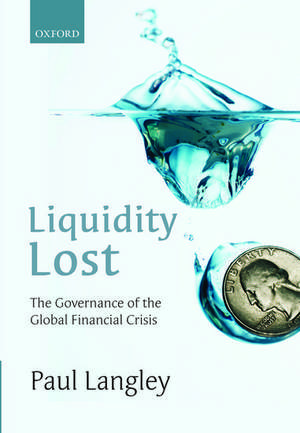Liquidity Lost: The Governance of the Global Financial Crisis
Autor Paul Langleyen Limba Engleză Hardback – 10 dec 2014
Preț: 551.49 lei
Preț vechi: 790.65 lei
-30% Nou
Puncte Express: 827
Preț estimativ în valută:
105.53€ • 112.85$ • 87.99£
105.53€ • 112.85$ • 87.99£
Carte tipărită la comandă
Livrare economică 07-14 aprilie
Preluare comenzi: 021 569.72.76
Specificații
ISBN-13: 9780199683789
ISBN-10: 0199683786
Pagini: 236
Dimensiuni: 163 x 238 x 20 mm
Greutate: 0.51 kg
Editura: Oxford University Press
Colecția OUP Oxford
Locul publicării:Oxford, United Kingdom
ISBN-10: 0199683786
Pagini: 236
Dimensiuni: 163 x 238 x 20 mm
Greutate: 0.51 kg
Editura: Oxford University Press
Colecția OUP Oxford
Locul publicării:Oxford, United Kingdom
Recenzii
This book by Langley ... offers an innovative analysis of how the global financial crisis of 2007 was governed ...Recommended
Langley has provided us with a new intellectual architecture, a robust approach to the dazzling complexities of the crisis and its aftermath, while also exposing the cultural exigencies underwriting wealth creation and popular security in our time. By so doing he extends and refines the ambitions of cultural economy, an emerging interdisciplinary field drawing on expertise in sociology, geography, anthropology, business, and organizational studies.
Langley offers a distinctive, theoretically sophisticated analysis of how the most serious financial crisis for nearly a century was managed.
Liquidity Lost presents a remarkable alternative perspective on the recent financial crisis. Both popular and critical accounts have been quick to understand the response to the economic upheaval in familiar categories: the state intervened to save the market. By contrast, Paul Langley shows how, in their efforts to navigate the crisis, policymakers reformatted both the regulatory instruments of government and the mechanisms of the economy. Among the books striking accomplishments is its account of how economics works both in the wild and in real time.
If you wonder, like everyone does, why the most severe financial crisis in living memory has not produced a fundamental change in the way we regulate economies and understand the role of banks, read this book. Drawing on an original reading of Deleuzes notions of modulation and mitigation, Langley shows in an empirically detailed manner how crisis response was driven by ad-hoc initiatives, minor modulations and sometimes conflicting approaches that were largely oriented toward rebuilding affective atmospheres of trust. Steering away from grand conceptions of neoliberalism, Langleys attentiveness to the situated contingency of crisis management brings the politics back into our understanding of financial regulation.
Langley has provided us with a new intellectual architecture, a robust approach to the dazzling complexities of the crisis and its aftermath, while also exposing the cultural exigencies underwriting wealth creation and popular security in our time. By so doing he extends and refines the ambitions of cultural economy, an emerging interdisciplinary field drawing on expertise in sociology, geography, anthropology, business, and organizational studies.
Langley offers a distinctive, theoretically sophisticated analysis of how the most serious financial crisis for nearly a century was managed.
Liquidity Lost presents a remarkable alternative perspective on the recent financial crisis. Both popular and critical accounts have been quick to understand the response to the economic upheaval in familiar categories: the state intervened to save the market. By contrast, Paul Langley shows how, in their efforts to navigate the crisis, policymakers reformatted both the regulatory instruments of government and the mechanisms of the economy. Among the books striking accomplishments is its account of how economics works both in the wild and in real time.
If you wonder, like everyone does, why the most severe financial crisis in living memory has not produced a fundamental change in the way we regulate economies and understand the role of banks, read this book. Drawing on an original reading of Deleuzes notions of modulation and mitigation, Langley shows in an empirically detailed manner how crisis response was driven by ad-hoc initiatives, minor modulations and sometimes conflicting approaches that were largely oriented toward rebuilding affective atmospheres of trust. Steering away from grand conceptions of neoliberalism, Langleys attentiveness to the situated contingency of crisis management brings the politics back into our understanding of financial regulation.
Notă biografică
Paul Langley is Reader in Economic Geography at the Department of Geography, Durham University, UK. He has published extensively on many aspects of global finance, and is the author of two previous books: The Everyday Life of Global Finance (Oxford University Press, 2008); and World Financial Orders (Routledge, 2002).
